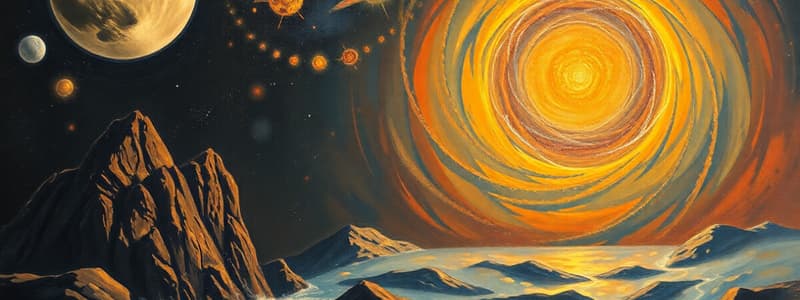Podcast
Questions and Answers
What does planetary geology study?
What does planetary geology study?
- The properties and processes of solid-surface objects in the Solar System. (correct)
- The movement of celestial bodies in space over time.
- The interactions of gases in the atmosphere of each planet.
- The formation of stars and galaxies in the universe.
Which fundamental particles were present one second after the Big Bang?
Which fundamental particles were present one second after the Big Bang?
- Hydrogens, Heliums, and Carbons.
- Atoms, molecules, and ions.
- Neutrons, electrons, and protons. (correct)
- Photons, neutrinos, and dark matter.
Who first introduced the idea of the Big Bang in scientific form?
Who first introduced the idea of the Big Bang in scientific form?
- Fred Hoyle.
- Edwin Hubble.
- Georges Lemaître. (correct)
- Albert Einstein.
What phenomenon occurred during the inflation period of the universe?
What phenomenon occurred during the inflation period of the universe?
What is the primary focus of planetary geology?
What is the primary focus of planetary geology?
What major event marks the beginning of the universe?
What major event marks the beginning of the universe?
Who is credited with the observations that contributed to the Big Bang theory?
Who is credited with the observations that contributed to the Big Bang theory?
What temperature did the universe reach one second after the Big Bang?
What temperature did the universe reach one second after the Big Bang?
What elements were primarily produced during the era of nucleosynthesis after the Big Bang?
What elements were primarily produced during the era of nucleosynthesis after the Big Bang?
What major event occurred approximately 380,000 years after the Big Bang?
What major event occurred approximately 380,000 years after the Big Bang?
What effect did the recombination phase have on the universe?
What effect did the recombination phase have on the universe?
During the Dark Ages, what was the primary composition of the universe?
During the Dark Ages, what was the primary composition of the universe?
What was critical for the formation of the first stars in the universe?
What was critical for the formation of the first stars in the universe?
How did the first stars compare to the Sun in terms of mass and brightness?
How did the first stars compare to the Sun in terms of mass and brightness?
What phenomenon is associated with the light created during the epoch of recombination?
What phenomenon is associated with the light created during the epoch of recombination?
What was one consequence of hydrogen absorption on light wavelengths during the Dark Ages?
What was one consequence of hydrogen absorption on light wavelengths during the Dark Ages?
Flashcards
Planetary Geology
Planetary Geology
The study of solid-surface objects in our Solar System, including their properties, processes, and history.
The Universe
The Universe
The totality of everything that exists, including all physical matter, energy, planets, stars, galaxies, and intergalactic space.
The Big Bang
The Big Bang
A scientific theory that proposes the universe originated from a incredibly hot, dense state and has been expanding ever since.
Cosmic Inflation
Cosmic Inflation
Signup and view all the flashcards
Primordial Soup
Primordial Soup
Signup and view all the flashcards
Accretion
Accretion
Signup and view all the flashcards
Differentiation
Differentiation
Signup and view all the flashcards
Cratering
Cratering
Signup and view all the flashcards
What is nucleosynthesis?
What is nucleosynthesis?
Signup and view all the flashcards
What is deuterium?
What is deuterium?
Signup and view all the flashcards
What is recombination?
What is recombination?
Signup and view all the flashcards
What is the cosmic microwave background?
What is the cosmic microwave background?
Signup and view all the flashcards
What are the Dark Ages?
What are the Dark Ages?
Signup and view all the flashcards
What are the first stars?
What are the first stars?
Signup and view all the flashcards
What is nuclear fusion?
What is nuclear fusion?
Signup and view all the flashcards
How do galaxies form?
How do galaxies form?
Signup and view all the flashcards
Study Notes
Planetary Geosciences
- Planetary geology studies the properties and processes of solid objects in the Solar System
- It's a relatively new field, drawing on techniques and understandings of Earth's geology to analyze other bodies in the Solar System
- Some planetary bodies are very different from Earth.
The Universe
- The Universe is everything that exists, including matter, energy, planets, stars, galaxies, and intergalactic space
- It originated from the Big Bang, an unimaginably hot, dense point.
Who Came Up With the Idea of Big Bang?
- Georges Lemaître, a Belgian cosmologist, formulated the concept of the Big Bang in 1931.
- Fred Hoyle, an astronomer, coined the term "Big Bang" in the late 1940's.
- Edwin Hubble's observations on the cosmic microwave background supported the Big Bang theory.
Evolution of the Universe (Initial Expansion)
- At the very beginning (10-32 of a second), the Universe experienced rapid expansion called inflation, making space expand extremely rapidly.
- Starting from a subatomic size, it expanded to the size of a golf ball virtually instantaneously.
Beginning of Everything
- After inflation, gravity started to slow the expansion of the Universe.
- One second after the Big Bang, an extremely hot primordial soup of light and particles (such as neutrons, electrons, and protons) comprised the cosmos.
Big Bang Nucleosynthesis
- Big Bang nucleosynthesis refers to the formation of light elements (hydrogen, helium) in the first few minutes after the Big Bang.
- Protons and neutrons combined to form deuterium (an isotope of hydrogen), which further combined to create helium.
- Additional reactions created lithium.
Recombination
- About 380,000 years after the Big Bang, the universe cooled sufficiently to combine free electrons with atomic nuclei (recombination).
- This process made the Universe transparent to light, allowing the release of the cosmic microwave background (CMB).
- The CMB is the oldest light that can be observed in the Universe.
Dark Ages
- After the CMB, the universe was once again opaque to shorter wavelengths of light due to absorption by hydrogen atoms.
- For the next 200 million years, it remained mostly dark without significant light sources.
- The Universe's composition comprised mostly hydrogen and helium atoms at this point.
First Stars
- Cooler, denser regions of gas in the early universe clumped together, leading to the formation of the first stars.
- The first stars were significantly larger (30-300 times the size of our sun) & brighter than the stars seen today.
- Their formation marked the beginning of the evolution of galaxies.
Reionization
- Starlight from newly-formed stars ionized the surrounding hydrogen gas, enabling light to travel further distances.
- By approximately 1 billion years after the Big Bang, the gas was almost fully ionized, leading to a transparent Universe.
Studying That Suits You
Use AI to generate personalized quizzes and flashcards to suit your learning preferences.




